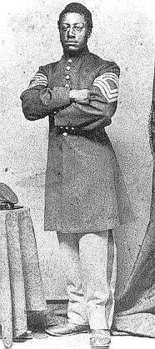Lewis Henry Douglass facts for kids
Quick facts for kids
Lewis Henry Douglass
|
|
|---|---|

Lewis Henry Douglass in his Union Army Uniform.
|
|
| Born | October 9, 1840 New Bedford, Massachusetts, U.S. |
| Died | September 19, 1908 (aged 67) Washington D.C., U.S. |
| Buried | |
| Allegiance | |
| Service/ |
(Union Army) |
| Years of service | 1863-1864 |
| Rank | |
| Battles/wars | American Civil War |
Lewis Henry Douglass (born October 9, 1840 – died September 19, 1908) was an important figure in American history. He was the oldest son of the famous abolitionist Frederick Douglass and his first wife, Anna Murray Douglass. Lewis was born in New Bedford, Massachusetts.
As a young boy, Lewis learned the skill of a typesetter in Rochester, New York. He worked for his father's anti-slavery newspapers, The North Star and Douglass' Weekly. This early training helped him later in life.
Contents
Fighting for Freedom in the Civil War
Lewis Henry Douglass joined the Union Army on March 25, 1863. This was just two months after the Emancipation Proclamation allowed African Americans to fight in the war. He became part of one of the first official African American military groups. This was the famous 54th Massachusetts Infantry Regiment.
Soon after joining, Douglass became a Sergeant Major. This was the highest rank an African American soldier could reach at that time. He fought in several important battles. These included the Battle of Grimball's Landing and the Battle of Olustee.
The Battle of Fort Wagner
Lewis Henry Douglass also fought in the Second Battle of Fort Wagner. This was a very tough battle. About half of his regiment was killed or wounded. However, this battle showed everyone how brave African American soldiers were. It helped change public opinion about their role in the war.
Douglass wrote a letter to his future wife, Helen Amelia Loguen, after this battle. He described the intense fighting. He said, "Our men fought well on both occasions." He also mentioned that he was lucky to survive the "perfect hail of shot and shell." He was proud that his regiment "established its reputation as a fighting regiment." He hoped to "fall with my face to the foe" if he died. He also wished for "a hundred thousand colored troops" to help end the war.
Lewis was wounded and became ill in 1864. Because of this, he had to leave the army.
Life After the War
After the Civil War, Lewis Henry Douglass continued to serve his community. He worked as a teacher for the Freedmen's Bureau. This organization helped formerly enslaved people.
In 1866, Lewis and his brother, Frederick Douglass, Jr., traveled to Denver. There, a friend of their father, Henry O. Wagoner, taught them more about typography. Lewis also taught reading, writing, and other subjects to Black adults in Wagoner's home.
A Career in Washington D.C.
Lewis married Helen Amelia Loguen in 1869. They moved to Washington D.C. There, he became the first African American typesetter hired by the Government Printing Office. However, he could not stay long because of racial unfairness. He was not allowed to join the typesetters' union.
Like his father, Lewis Henry Douglass was a very important citizen in Washington D.C. He helped start and was a senior editor for the New National Era newspaper (1870-1874). This newspaper focused on issues important to the Black community in D.C.
A Voice for Equality
Lewis also had a big impact in politics. President Ulysses S. Grant appointed him to the legislative council of the District of Columbia. In this role, he worked for racial equality. For example, he created a bill that made restaurants post their prices. This stopped them from charging Black customers more money unfairly.
Douglass also spoke out against U.S. expansion into other countries. He criticized the McKinley government for its actions in the Philippines. He believed the government should focus on solving racial violence at home instead. He famously said that "whatever this government controls, injustice to dark races prevails."
Lewis Henry Douglass had a stroke in 1904. He passed away four years later, in 1908, at the age of 67.

